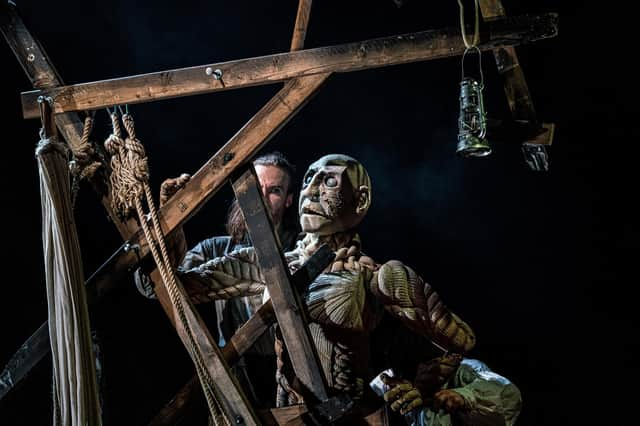Frankenstein on the Eastbourne stage: horrible imaginings become starkly dramatic theatre


Horrible imaginings are turned into starkly dramatic theatre this week at Eastbourne’s Devonshire Park, where BlackEyed Theatre present Mary Shelley’s Frankenstein.
The show is a faithful revival of BlackEyed’s 2016 production, much enjoyed at the time by this Eastbourne Herald reviewer! As all live theatre, it still pulses with dramatic impact.
Advertisement
Hide AdAdvertisement
Hide AdThe simple title of Frankenstein evokes some of the wrong images: Boris Karloff and crew did no favours to Mary Shelley, for her original story is much more profound than the hammy clichés and schlock-horror effects which have been spawned from it. She wrote it at only 21 years old; and from the pen of a woman author in the early 19th Century it breaks astonishing new ground.
Director Eliot Giuralarocca and adapters Nick Lane and John Ginman have at once stayed faithful to the original, and yet given it new impact: a study in human aspiration, human frailty and human tragedy.
Mary Shelley's novel is a remarkably precocious and daring work. It anticipates many of the dilemmas still confronting modern science: does a scientist simply explore and experiment, and leave the world to be scorched by the hot coals of his or her findings? Or are there limits, are there places where science should simply never go? The greed for knowledge is threaded through both science and human imagination: from Prometheus to Faust to Galileo and beyond. If I had known, wrote Albert Einstein, I would have been a watchmaker…
In the show's programme Giuralarocca speaks of the "obsessive scientist usurping God", and in the title role of conflicted scientist Victor Frankenstein, Robert Bradley convincingly embodies the driven, almost greedy obsession of a man who seeks to create life. “Nature is a secret that I have to reveal…”
Advertisement
Hide AdAdvertisement
Hide AdThe journey of discovery which will end in tragic destruction begins in relative innocence. Frankenstein is a young student version of Marlowe's Faustus, brought up in a civilised, educated family in Geneva but drawn to the University of Ingolstadt – in Mary Shelley’s time, a centre of excellence in medical research.
Robert Bradley's descent to destruction is measured, gripping and genuinely poignant. He progresses credibly from eager student to driven, self-destroying wreck - a tricky journey for an actor to take in a couple of hours. Surrounding him, the other four actors are uniformly excellent, switching roles with ease and confidence.
The play opens, so to speak, at the end, before the story moves backwards in time. Frankenstein's Creature has been banished to the Arctic wastes, where the ship of Captain Robert Walton sits gripped in the ice. Benedict Hastings’ Walton is a voice of reason, urging but unheeded. Its prow, hugely dominating the stage, is a bold choice by set designer Victoria Spearing, becoming a flexible part of the set and the action – but if it looks like a ship and creaks like a ship…